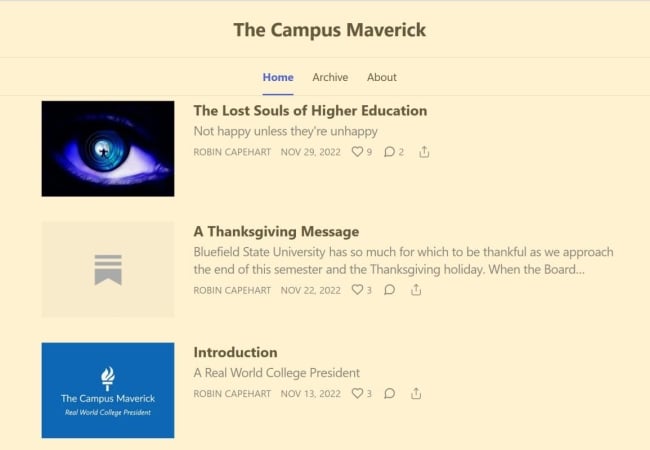You have /5 articles left.
Sign up for a free account or log in.

Robin Capehart, Bluefield State University’s president, has a blog called ‘The Campus Maverick.’
Screenshot from Substack
Leaders of West Virginia’s Bluefield State University eliminated the Faculty Senate and instituted a posttenure review process that an American Association of University Professors officer says diverges significantly from that organization’s recommendations.
An AAUP advisory letter issued last week also said the “Campus Maverick” blog written by Robin Capehart, Bluefield State’s president, “would appear to be unhelpful in repairing the relationship between the administration and the faculty.”
That relationship has come to the point of no-confidence votes and complaints to the Higher Learning Commission, which is the regional accrediting body for Bluefield State and other West Virginia public universities. In a blog post this month, Capehart discussed possibly disciplining, and even terminating, faculty members who complained to the commission.
The university didn’t respond to requests for comment Tuesday.
“Publishing our names campuswide and then having that put in the newspaper, basically threatening to fire us in his blog, you know, it’s just very clear that there are certain faculty members here that he wants to get rid of,” said Amanda Matoushek, a tenured associate professor who was among those who complained to the commission.
Though Capehart admitted to an ethics violation in 2015 amid his departure from the presidency of West Liberty University, he went on to work for and has continued to receive support from the Republican-dominated West Virginia State Senate. The university Board of Governors overseeing him also includes a former Republican Senate president, and it is chaired by that Senate president’s brother.
The AAUP letter says the Faculty Senate nearly unanimously voted in October that it had no confidence in Capehart, the Board of Governors and Brent Benjamin, Bluefield State’s executive vice president and general counsel and a former West Virginia Supreme Court justice.
The letter says the no-confidence resolutions complained about the rejection of a Faculty Senate officer election; the replacement of the Faculty Senate with a broader Faculty Assembly “without the consent of faculty”; “the elimination of required faculty peer review of new academic hires, courses, curricula and programs”; and the redefinition of “tenure status and tenure-track status, as well as post-tenure review and tenure protections for continuing employment, without any due discussion or prior notification of intent to the faculty or Faculty Senate.”
In a blog post from November, Capehart dubbed “lost souls” the “small group of faculty members who pushed a ‘no confidence’ vote on the Board of Governors, president and executive vice president by peddling false narratives and ignoring the advancements made in the past four years.”
“The lost souls share most—if not all—of the following attributes,” Capehart wrote. Among the listed attributes: “They are ungrateful,” “They feel entitled to everything” and “They are spiritually disconnected. What’s God got to do with it? I’ve done it all myself.”
The university has said an unpublished Jan. 23 letter from the Higher Learning Commission “summarily dismissed” similar recent faculty complaints to that accreditor. And Capehart’s latest blog post, Feb. 7’s “Bullet proof,” suggests he’s considering disciplining the complainants.
“There is no problem with faculty questioning, challenging or disagreeing with proposed policies. In fact, the reason the board moved to a faculty assembly was to provide more opportunity for more voices to be heard,” Capehart wrote. “Moreover, state law—and common sense—requires campus leadership to ‘consult’ with faculty on any actions that may impact then.”
“However, when faculty members file an official complaint with a national accrediting body—an organization whose approval is necessary for our students to access federal funding in order to pursue an education—and the accusations are premised with no less than pure falsehoods, they have advanced the discussion beyond the point of tolerance of unprofessionalism to a point of academic dishonesty,” he wrote.
“At our institutions as with most, academic dishonesty is grounds for dismissal,” he wrote. “However, to do so will undoubtedly bring cries of ‘retaliation’ and the obligatory filing of grievances.”
“So, what is campus leadership to do?” he wrote. “On one hand, to pursue dismissal on the grounds of academic dishonesty may leave the issue in the hands of an administrative and judicial hearing system that has historically created a very low bar for the affirmation of claims of ‘retaliation.’ On the other hand, to just declare victory and move on would provide no disincentive for future baseless claims and would render such claimants as ‘bullet proof.’ If you are truly dedicated to maintaining the credibility of the institution, the imposition of some form of disciplinary action is necessary.”
The Higher Learning Commission didn’t provide Inside Higher Ed a copy of its letter, with a spokeswoman for that accreditor saying it “does not publish letters in response to complaints.”
On Feb. 3, WVVA, a TV news station in Bluefield, posted what it said was a full statement from the university after the commission, at least according to the university, “summarily dismissed” the complaints. That university statement named the four faculty members who complained, including Matoushek, and their names were also in The Bluefield Daily Telegraph.
The WVVA story also linked to a document that contains Bluefield State’s response to the complaint to the Higher Learning Commission.
“Contrary to the assertions of the complainants, the proactive actions taken by the Board of Governors since 2019 fulfill its duties under West Virginia law, and, specifically in the area of shared governance, actually enhance meaningful faculty input, advice and assistance by expanding faculty involvement with the Board of Governors to a full Faculty Assembly,” the document says.
Michael DeCesare, an AAUP senior program officer in its Department of Academic Freedom, Tenure and Governance, wrote last week’s AAUP advisory letter.
“Any decision to revise the faculty governance structure at the university should be made jointly with the faculty rather than unilaterally by the administration and Board of Governors,” DeCesare wrote. “For an administration or board to unilaterally replace one faculty governance structure with another would represent an egregious violation of widely accepted governance standards
He also wrote that “Under AAUP-recommended standards, it would be inappropriate for an administration or governing board to unilaterally establish a formal system of post-tenure review.”
“The written standards and criteria by which faculty members are evaluated in post-tenure review should be developed and periodically reviewed by the faculty,” he wrote. “The faculty should also conduct the actual review process.”
“It appears that the sole parties involved in Bluefield State’s procedure, other than the faculty member undergoing review, are the dean, the provost and the president,” he wrote. “The only faculty involvement occurs over a two-month period during which faculty members may ‘submit any comments as they relate to specific criteria set forth’; faculty comments are submitted to the dean rather than to a faculty body.”




